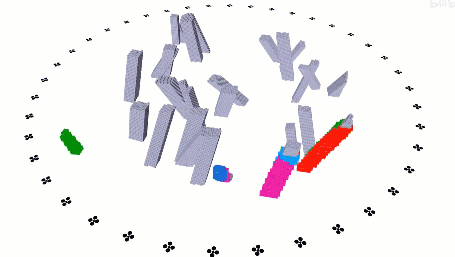Aerial swarm navigation has always been challenging in unknown, complex environments, especially without any external positioning and computing system. Recently, the FAST Lab of Zhejiang University has made further breakthroughs in this field. A distributed swarm trajectory planning algorithm was proposed in the latest technical report. It mainly features spatial-temporal optimization, which significantly improves the quality of generated trajectory and saves computation. Specifically, it only takes several milliseconds to calculate a local spatial-temporal optimal trajectory on embedded devices such as onboard computers. Furthermore, its complexity only increases linearly to the number of agents. Indoor and outdoor experiments verify the algorithm’s effectiveness, and the relevant results are reported by the authoritative scientific and technological media IEEE spectrum.
Front-Post
December 17th, 2020 Our recent work “EGO-Swarm” is reported by Science. EGO-Swarm is a decentralized and asynchronous systematic solution for multi-robot autonomous navigation in unknown obstacle-rich scenes using merely onboard resources. Author: Xin Zhou, Jiangchao Zhu, Hongyu Zhou, Chao Xu, and Fei Gao from the ZJU Fast Lab. Related Paper: EGO-Swarm: A Fully Autonomous and Decentralized Quadrotor Swarm System in Cluttered Environments (Submitted to ICRA2021). [Preprint] Video Links: YouTube, bilibili (for Mainland China)
Introduction High-speed autonomous navigation with micro aerial vehicles (MAVs) operating in unknown dynamic environments requires the vehicles to be capable of quick replans to avoid potential obstacles. The high operating speed, the short sensing range and the unknown dynamic environments all leave strictly limited reaction time to make motion plans of high qualities. Developing reasonable navigation frameworks and fast motion planning algorithms is an essential part of it, especially for those lightweight multi-rotors with limited onboard sensing and computation capabilities. The projects under this topic focus on developing effective yet computation-friendly motion planning methods to enable safe and high-speed navigation of MAVs, considering constraints and sensing and control uncertainties. Related Researches: TGK-Planner: An Efficient Topology Guided Kinodynamic Planner for Autonomous Quadrotors, Hongkai Ye, Xin Zhou, Chao Xu, Jian Chu, Fei Gao, IEEE Robotics and Automation Letter (RA-L). [paper] [code] EGO-Planner: An ESDF-free Gradient-based Local Planner for Quadrotors, Xin Zhou, Zhepei Wang, Chao Xu, Fei Gao, IEEE Robotics and Automation Letter (RA-L with ICRA 2021 option). [paper] [code] Mapless-Planner: A Robust and Fast Planning Framework for Aggressive Autonomous Flight without Map Fusion, Jialin Ji, Zhepei Wang, Yingjian Wang, Chao Xu, Fei Gao, the International Conference on Robotics and Automation (ICRA 2021). [paper] EVA-Planner: Environmental Adaptive Quadrotor Planning, Lun Quan, Zhiwei Zhang, Chao Xu, Fei Gao, the International Conference on Robotics and Automation (ICRA 2021). [paper] [code] Video Links: TGK-Planner: https://www.bilibili.com/video/BV1gA411e7DH EGO-Planner: https://www.bilibili.com/video/BV1VC4y1t7F4 Mapless-Planner: https://www.bilibili.com/video/BV1mt4y1e7TS EVA-Planner: https://www.bilibili.com/video/BV1Zz4y1C7rt
Introduction The agility of quadrotors enables this machine to perform single-agent autonomous navigation in unknown environments and multi-agent precise formation control in open or known fields. However, few works combine both of them to present any real-world system which is capable of navigating quadrotor swarms sharing the same unknown space, especially with only onboard processing. This project is a systematic solution that enables high-performance traveling in cluttered environments for quadrotor swarms in field environments. In addition, it requires no external localization and computation or a pre-built map. Related Research: EGO-Swarm: A Fully Autonomous and Decentralized Quadrotor Swarm System in Cluttered Environments, Xin Zhou, Jiangchao Zhu, Hongyu Zhou, Chao Xu, Fei Gao, the International Conference on Robotics and Automation (ICRA 2021). [paper] [code]



